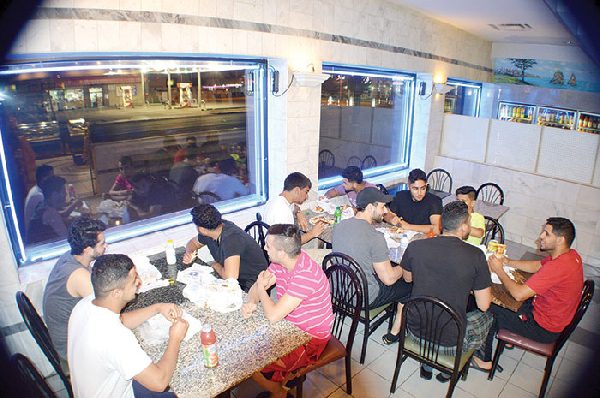
|
| Customers eat in the early morning at Golden Bakery |
DEARBORN — Each year, Ramadan brings both traditional and new festivities that unites the Muslim people in communities all over the world. Ramadan has often been called “Christmas time for Muslims.”
That’s very true in Dearborn, where “Christmas lights” have dominated neighborhoods across the city as Muslim households express the festivities of the holy month through a traditional American practice.
During the past four years, Ramadan has become more difficult for those who are fasting due to it falling during the longer daylight hours of the summer months. Even so, Dearborn and Dearborn Heights have become cities that never sleep.
It has become a common practice for many shop owners, workers, etc. to adjust their schedules and/or store hours of operation to accommodate the ease of their fasting and cater to customers who may be fasting. Many businesses— mainly restaurants and cafes— have made an adjustment.
Diab Hamadi, the owner of the two Al-Ajami restaurants in Dearborn, said business goes up during the holy month, although the eatery loses a significant chunk of its patrons during most of its hours of operation. Iftar (dinner) makes up for it.
Al-Ajami, like many restaurants in Dearborn, offers an open buffet for iftar that includes dates, salads, soup, seafood options and oozi, its signature stuffed lamb. However, the regular menu will still be available during iftar.
Hamadi said he lived in Virginia for 32 years, where Ramadan “never felt like how it is supposed to feel.”
“Here in Dearborn you feel the spirit of Ramadan,” he said.
Cafes and bakeries in Dearborn and Dearborn Heights have also expanded their schedules during Ramadan. Shops such as Yasmeen Bakery and Golden Bakery will be open 24 hours to be able to serve both iftar and sahoor (early breakfast).
This, in turn, has caused an increase of traffic during the a.m. hours in Dearborn and Dearborn Heights. While households in cities across Michigan are sound asleep, the Arab American community is up and awake, consuming meals before sunrise.
The practice of sahoor has seen a significant uptick in recent years in the local community. Because Ramadan has fallen during the summer, young adults are out of school and able to stay out late every evening.
For Golden Bakery owner Hussein Hammoud, Ramadan means business. Located at 14526 W. Warren Ave. in Dearborn, the bakery stays open around the clock, while its second location, in Dearborn Heights, only closes for a few hours during the day. Between midnight at 4 a.m., customers line up to order menu items such as cheese, oregano and meat mana’eesh, as well as spinach and meat pies and fresh baked bread. Many customers say these are substantial enough to fill them up well into the next day.
“It is really busy here at night,” a Golden Bakery employee told The Arab American News. “On weekdays, we usually get groups of guys who come in and eat, but on weekends we are even busier— because we get families and children.”
In Dearborn Heights, Saj Bakery seems to have become a prominent fixture for the city’s smaller but growing Muslim community, thanks in part to its prime location at the corner of Ford Rd. and Beech Daly. During the first weekend of Ramadan, lines were nearly out the door between 1 and 4 a.m.
Sahoor has transformed into a social event for many local Muslims. Hookah lounges and café’s, such as the Lava Lounge in Dearborn Heights and Sky Café’ in Dearborn, are open until customers clear their venues.
“The reality is business is down, but at night it’s crazy,” said Angela Jaafar, co-owner of the Lava Lounge. “The atmosphere is very electrifying. A lot of people are coming…our patio is overloaded with customers. Ramadan season is definitely in the air.”
The Lava Lounge adjusted its schedule during the holy month, opening every day at 1 p.m. to serve customers for lunch. To prepare for dinner, the venue offers a Ramadan buffet for iftar.
Like many other businesses, the venue also has to cater to employees who may be fasting. Jaafar said management worked out a system to accommodate those employees accordingly.
“We allow them to break their fast at work,” Jaafar said. “They will break their fast with the buffet and we have them rotate. It actually works out pretty good.”
Of the three commonly visited coffee shops, Starbucks, Tim Hortons and Biggby, the latter is the only one to make adjustments to its schedule, by extending its closing time from 9 p.m. to midnight.
Khilloud Dabaja, the owner of Biggby coffee in Dearborn, described how the staff will adjust to their new schedule.
“We meet and discussed as a team what time would be best time for us to close and we decided at the end that at midnight would be most fair,” Dabaja said.
Fasting begins about 4 a.m. and ends when the sun sets after 9 p.m., making it a 17 hour day before iftar for the whole month.
“Half our employees are Muslim and will be fasting, so most of our non-Muslim employees very kindly took the early morning shifts,” Dabaja said. “And every employee is required to work at least one night shift during the week, to make it fair for everyone during our new schedule.”






Leave a Reply